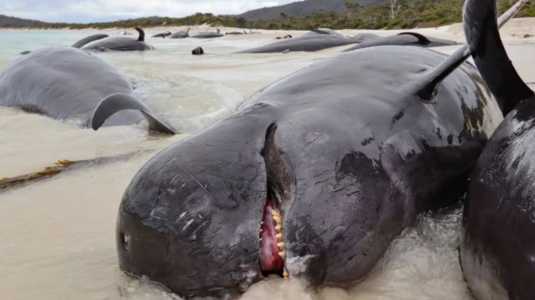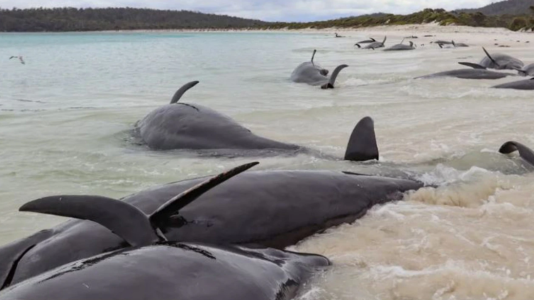Over 30 dolphins found dead on Tasmanian beach
By
- Replies 5
The tranquil shoreline of Bryan's Beach on Tasmania's Freycinet Peninsula was sadly the site of tragedy when 34 long-finned pilot whales were discovered dead along the coast.
Pilot whales—whose size is only surpassed by orcas—are actually members of the oceanic dolphin family.
According to a spokesperson from Tasmania’s Natural Resources and Environment Department, who confirmed the deaths and sent staff to assess the situation, 'It is not known why the whales stranded and is often not possible to determine.'
‘Staff, including a wildlife veterinarian, are on site to assess the situation and sample and measure the carcasses,’ the spokesperson added.
It was a real struggle for nature photographer and guide, Chris Theobald, to take it all in. Upon seeing the stark reality, Theobald took to social media to share photographs showing the devastating scene.
'Confronting scenes today on our Peninsula. An overnight mass stranding of over 30 Pilot whales,' he said, adding that this could be the result of 'relentless fishing and pollution' in the area.
Theobald described the occurrence as a ‘mass stranding’ and assumed that the whales ‘died fairly quickly’, potentially suggesting that all of the dolphins were sick.
‘Strong social bonds may lead to a herd following a sick or disorientated pod member into trouble but this particular group with males, females & calves died fairly quickly, suggesting they all could have been sick,’ he said.
Unfortunately, according to Theobald, 'there was no time to save any [dolphins].'
One of the worst stranding events in Australia's history took place in Tasmania back in September 2020, where 450 long-finned pilot whales sadly washed up on Macquarie Harbour.

Do you know other ways to help protect the world’s dolphin population? Share your ideas in the comments below!
Pilot whales—whose size is only surpassed by orcas—are actually members of the oceanic dolphin family.
According to a spokesperson from Tasmania’s Natural Resources and Environment Department, who confirmed the deaths and sent staff to assess the situation, 'It is not known why the whales stranded and is often not possible to determine.'
‘Staff, including a wildlife veterinarian, are on site to assess the situation and sample and measure the carcasses,’ the spokesperson added.
It was a real struggle for nature photographer and guide, Chris Theobald, to take it all in. Upon seeing the stark reality, Theobald took to social media to share photographs showing the devastating scene.
'Confronting scenes today on our Peninsula. An overnight mass stranding of over 30 Pilot whales,' he said, adding that this could be the result of 'relentless fishing and pollution' in the area.
Theobald described the occurrence as a ‘mass stranding’ and assumed that the whales ‘died fairly quickly’, potentially suggesting that all of the dolphins were sick.
‘Strong social bonds may lead to a herd following a sick or disorientated pod member into trouble but this particular group with males, females & calves died fairly quickly, suggesting they all could have been sick,’ he said.
Unfortunately, according to Theobald, 'there was no time to save any [dolphins].'
One of the worst stranding events in Australia's history took place in Tasmania back in September 2020, where 450 long-finned pilot whales sadly washed up on Macquarie Harbour.
Key Takeaways
- Over 30 pilot whales have been found dead on Bryan's Beach in the Freycinet Peninsula, Tasmania, in a mass stranding event.
- The deaths were confirmed by Tasmania's Natural Resources and Environment Department, who sent staff, including a wildlife veterinarian, to assess the situation.
- Local photographer and nature guide Chris Theobald suggested that the whales could all have been sick as they died fairly quickly and may have followed a sick or disoriented pod member.
- This stranding follows the worst such event in Australia's history in September 2020, when 450 long-finned pilot whales washed up in Macquarie Harbour, Tasmania.
Do you know other ways to help protect the world’s dolphin population? Share your ideas in the comments below!









